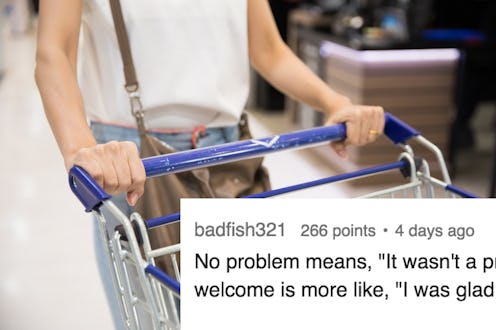Life
This Viral Thread Will Make You Feel Seen If You Say "No Problem" Over "You're Welcome"

Stonehenge. The Bermuda Triangle. Pineapple on pizza. The world is full of inexplicable mysteries and debates. Another one we should add to the list? Whether you should say "You're welcome" or "No problem" when someone thanks you.
Ah, yes! A question that has plagued humankind for centuries. My female friends and I will sometimes sit around the fireplace engaged in deep conversation about the correct response to "thank you." When we're really confused, we'll pull out the Ouija board and consult our ancestors for guidance, whilst reading ancient scripts by candlelight and digging through leather-bound books looking for the answer.
Not really.
And you know why? Because the answer is clearly "You're welcome."
But apparently, there are people out there who have serious opinions about what you're supposed to say when someone thanks you, so now we can all be paranoid about offending each other in a whole new way.
For starters, what's the difference between the two responses? Is there one? This one Redditor cleared it up rather succinctly.
While I'm for "You're welcome" all the way, I was kind of under the impression that any verbal response was considered acceptable by most people, as long as it isn't something like, "Damn right you should thank me," but I was wrong. I concede.
How do other people feel about this? Is "You're welcome" ideal? Is "No problem" preferable? Would it be easier for me to say nothing at all and just walk away? (Probably.)
Let's explore.
Team "You're Welcome"
Shockingly, these people seem to be in the minority, which would displease my mother greatly.
Team... Everyone Else
If you don't say "You're welcome," what the heck do you say? People come up with all types of responses — not just "No problem."
"No worries" seems to be a popular choice, which makes me uncomfortable. Why would anyone worry? Now I'm just confused.
"Hey, no problem, man" definitely carries a special... something. Not quite sure what that something is yet.
Then, there are people who believe "You're welcome" is a hard no. They think it sounds strange, rude, even condescending.
Then there's this person, who's pretty much like, "Hell with all of you," and instead keeps it simple.
A lot of weird things happen on Reddit, and I wasn't quite ready to stop my research here. So I went on the hunt for proof that "You're welcome" is the best, most proper response — and didn't find it.
Robert Cialdini studied persuasion for 40 years and even authored a book titled Influence, and here's what he found, according to the HuffPost.
"There is a moment of power that we are all afforded as soon as someone has said 'thank you,'" he explains. If you respond with "You're welcome," you're missing the opportunity to respond to that moment of power.
Instead, he suggests you say, "I know you’d do the same for me," which sounds incredibly awkward but offers three benefits:
- It communicates that you and the other person have the kind of relationship where you can ask each other for favors.
- It establishes that you're willing to help others.
- It encourages reciprocity.
This clearly only works with people who really know each other. When your waiter brings your grilled cheese sandwich and you thank them, I think we can all agree that the proper response from their end is definitely not, "I know you'd do the same for me."
Thankfully, I have at least one person in my corner: Maryanne Parker, author of Posh Overnight: The 10 Pillars of Social Etiquette and founder of Manor of Manners. Speaking to CountryLiving, she says, "Unfortunately, certain behaviors are often considered to be over-the-top instead of accepted as proper manners," adding that "You're welcome" is meant to be courteous but can sometimes be taken as insincere.
Parker confirms that it's not the words that are problematic, and what we should instead be mindful of is our delivery — things like our tone and body language. When said in a genuine manner, there's absolutely nothing wrong with "You're welcome."
So there!
To be clear, Parker says other responses are acceptable in a more casual environment — including "No worries" and "Of course." Whatever, Maryanne.
Which side are you on?